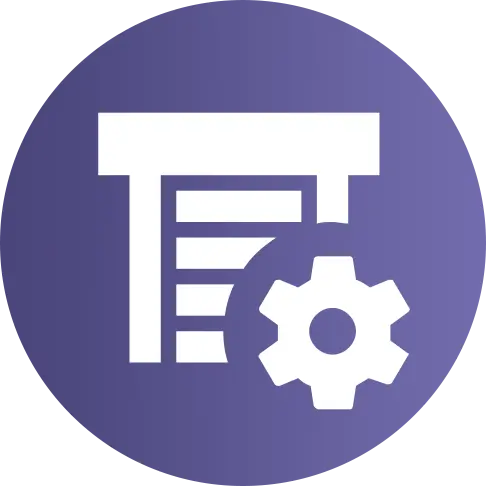Request your Consulting Kit
Request without compromise your digital advice bonus to improve your business in any of these categories
Segment a
UNTIL
12.000€
to
49
employees
Deadline for submitting applications is extended:
until February 28, 2025 at 11:00 a.m.
Segment b
UNTIL
18.000€
companies from
50 to 99
employees
Deadline for submitting applications is extended:
until February 28, 2025 at 11:00 a.m.
Segment c
UNTIL
24.000€
Companies from
100 to 249
employees
Deadline for submitting applications is extended:
until February 28, 2025 at 11:00 a.m.
We will be with you a minimum of 12 months to ensure your digital solution.

Segment A: 6.000€
Segment B: 6.000€
Segment C: 6.000€
- The main objective of this service is to provide you with an artificial intelligence plan adapted to the needs of your SME. You will know the required investment and the necessary measures for its adoption. In addition, your learning in artificial intelligence techniques will be prioritized. A use case will also be made adapted to your SME.
Data analysis
Identification of relevant data sets for the implementation of AI algorithms, in this way you can have a better understanding of your SME information.
Protocols creation
Advise you for the creation of data governance protocols with regulations, guaranteeing their validity and veracity when applying AI.
IA tool analysis
Analyze AI tools for data management, making recommendations based on the reality and investment capacity of your SME.
Decision making
Guide yourself on how AI techniques can derive valuable information from existing data to boost strategic decision making.
Train in the strategic use of AI techniques in data management.
IA application
Develop and execute a case of use adapted to the business, related to the application of artificial intelligence.
1 - Define objectives and initial evaluation
- Identification of the commercial and technical objectives of the SME in relation to the adoption of AI.
- An initial diagnosis is made to evaluate the current situation of the company regarding the use and implementation of AI, identifying key areas where it can be applied.
2 - Identification and evaluation of available data
- Analysis of the existing data in the SME to determine their quality, relevance and format in order to implement them in AI algorithms.
- Suggestions from additional data sources are offered if necessary, and advice is provided to guarantee data governance in accordance with regulations (GDPR, UNE).
3 - Analysis and selection of AI tools
- An evaluation of the AI tools that best adapt to the needs and investment capacity of the SME is carried out.
- Personalized recommendations of technologies are offered, considering aspects such as ease of use, scalability and cost. Tools such as Microsoft Azure, Google Cloud, AWS, or open source solutions can be suggested.
4 - Creation of data governance protocols
- Advice is established to create protocols that ensure adequate and safe management of the data.
- These protocols guarantee the quality, integrity and validity of the data used, complying with international regulations such as GDPR and UNE standards.
5 - Development of a personalized use case
- It works together with the SME to develop a use case that applies AI techniques in a specific area of the business (for example, demand prediction, customer segmentation, etc.).
- This case of use allows to demonstrate the practical value that AI can contribute to the company in terms of operational efficiency or process improvement.
6 - Recommendations for implementation
- Recommendations are elaborated on how to implement AI in the key areas of the company, with suggestions to automate repetitive tasks through RPA (Robotic Process Automation).
- Total implementation and automation will depend on the company's investment capacity, and advice is offered to test and evaluate solutions.
7 - Training in the use of AI
- Personnel training in the strategic use of selected AI tools, with the objective that they can manage and take advantage of these technologies efficiently.
- Practical guides and manuals will be provided to ensure that the equipment can implement the proposed solutions.

Segment A: 6.000€
Segment B: 6.000€
Segment C: 6.000€
- The main objective of this service is to provide you with a basic data analysis plan adapted to the needs of your SME. You will know the required investment and the necessary measures for its adoption. In addition, your learning in processes for extraction and data analysis will be prioritized
- The attached digital advisor will be responsible for carrying out a series of activities to guarantee the correct implementation of the basic data analysis plan.
Identify relevant data
- Identify those data from your SME that improve the understanding of available information.
Evaluate artificial intelligence tools
- Analyze the different artificial intelligence tools options to exploit and visualize the data, recommending the one that best suits the current situation of your SME and the investment necessary for its adoption.
Generate value information with AI
- Establish value information from the data treaty with artificial intelligence algorithms.
Data exploitation advice
- Advise on the exploitation of the data through the chosen tool.
Advice on data management processes
- Optionally, you can advise you on the processes of government, management and quality management of the data according to the specifications UNE 0077 “Government of the data”, UNE 0078 “Data management” and UNE 0079 “Data quality management”.
Development of use cases in data analysis
- Develop and execute a case of use adapted to the business in data analysis (basic level).
IDENTIFICATION OF OPPORTUNITIES OF IA
- Identify opportunities or possible uses of AI in the field of data analysis.
1 - Define objectives and initial evaluation
- The strategic objectives of SMEs related to data analysis are identified.
- An initial diagnosis is made to evaluate the current situation of the use and exploitation of data in the company, determining the maturity of the current data management system.
2 - Data identification and evaluation
- The existing databases are analyzed to evaluate their location, type, volume and relevance.
- The quality of the data and its ability to integrate into advanced analysis processes are evaluated. Additional sources are suggested if necessary.
- Recommendations are offered to improve the structure of the data according to standards such as the entity-relation (MER) model.
3 - Visualization tools analysis
- Different data display tools are evaluated, considering the ease of use, integration capacity with current systems and associated costs such as Tableau, Power BI, Google Data Studio, etc.
- Personalized recommendations of tools are provided that best adapt to the needs of the SME.
4 - KPIS definition and analysis
- It works next to the SME to define the key performance indicators (KPIS) most relevant to the business.
- The current use of kpis in the company is analyzed and opportunities for improvement are identified.
- The creation of new kpis with metric and calculation formulas that better reflect the strategic objectives of the company is proposed.
5 - Creation of data quality policies
- SME is advised on creating data quality policies that include format standardization, data cleaning and coherence between systems.
- Procedures are ensured that comply with data privacy regulations.
6 - Development of a personalized use case
- The SME is collaborated to develop a use case that applies the results of the data analysis in a specific business situation.
- The case of use adapts to the real needs of the company, allowing to demonstrate the practical value of data analysis in decision making.
7 - Training in the use of tools
- Training is offered to SME personnel on the selected tools for data analysis and visualization.
- Manuals and practical guides are provided to ensure that the internal equipment can handle these tools effectively.

Segment A: 6.000€
Segment B: 6.000€
Segment C: 6.000€
- If you already have a basic data analysis system, the main objective of this service is to provide you with a more advanced analysis plan adapted to the needs of your SME.
- This plan will determine the investment and the necessary measures so that you can establish an advanced data analysis system in your SME, prioritizing the establishment, improvement, automation and learning of processes for extraction and data analysis.
Data valuation and use
Identify your SME data, obtain its assessment and evaluate its use in conjunction with other sources.
Valuable information generation with AI
Generate and obtain value information based on the data treaty with artificial intelligence algorithms to improve data -based decision making.
Data management advice
Provide advice for the understanding of your SME data and the management of data management tools.
Evaluation of data management processes
Optionally, you can advise you on the evaluation of the capacity of the government processes, management and quality management of the data following the UNE 0080 specification of “Government Evaluation Guide, Management and Management of Data Quality” and the SPECIFICATION UNE 0081 ”Data Quality Evaluation Guide"
Development of use cases with advanced AI
Develop and execute a case of use adapted to your SME using artificial intelligence techniques, in data analysis (advanced level).
Advanced AI opportunities identification
Identify opportunities or possible uses of AI in the field of advanced data analysis.
1 - Analysis and results of the basic solution
- Review the results of the basic service, evaluating the current SME situation regarding data analysis.
- Identify databases, quality procedures implemented and previous recommendations on tools used.
2 - Define objectives and initial evaluation
- Establish the objectives of the advanced data analysis system, aligning the strategy with the commercial needs of the SME.
- Evaluate the internal data of the SME and its potential to integrate with external sources (such as market studies or public databases).
3 - Centralized database creation
- Design a centralized architecture for data management and storage, structuring tables, relationships between entities, and ensuring the integrity of primary and foreign keys.
- Produce a detailed action plan for data loading and transformation processes.
4 - Identification and evaluation of advanced tools
- Perform an analysis of advanced tools for management and display of data that are suitable for SMEs.
- Consider factors such as ease of use, costs and compatibility with existing systems.
- Provide tools recommendations that best adapt to the needs of the SME.
5 - Development of a personalized use case
- Work together with SME to develop and implement a use case that applies advanced AI techniques, such as predictive models or real -time analysis.
- Measure the results obtained, document best practices and make recommendations on the scalability of the case of use in other business areas.
6 - IDENTIFICATION OF OPPORTUNITIES OF IA
- Explore additional areas within SME where AI can add value through automation or process improvement.
- Propose new AI applications, such as natural language processing (NLP) or Machine Learning, which can align with the strategic objectives of the company.

Segment A: 6.000€
Segment B: 6.000€
Segment C: 6.000€
- The main objective of this service is to establish the necessary investment and digital marketing techniques, including the use of artificial intelligence technologies, to improve the performance of your online sales, and carry out a case of use adapted to the digital sales area of your SME.
- The attached digital advisor will be in charge of carrying out a series of activities to guarantee the correct implementation of the plan to improve your digital sales.
Digital sales analysis and online presence
Analyze the current situation of your SME in digital sales, positioning in RRSS and Internet presence.
Awareness on Sales and Digital Marketing
Raise awareness among your employees about the importance and online sales techniques and digital marketing.
Definition of long -term digital strategy
Define an online sales strategy and digital presence (RRSS, search engines, Google Analytics, etc.) in the medium and long term, using predictive models based on AI.
Development of use cases in digital sales
Develop and execute a case of use adapted to your SME using the appropriate artificial intelligence techniques, in the digital sales area.
Identification of opportunities in digital sales
Identification of opportunities or possible uses of AI in the field of digital sales.
1 - Initial diagnosis
Aim:
- Evaluate the current status of company digital sales.
Activities:
- Initial meeting with the management team to understand commercial objectives.
- Current digital sales data analysis (conversions, web traffic, customer behavior).
- Identification of strengths and weaknesses in the current sales strategy.
2 - Definition of objectives
Aim:
- Establish clear and attainable goals for digital sales.
Activities:
- Co-creation workshop with the sales team to define KPIS.
- Establishment of short, medium and long term objectives.
- Alignment of the objectives with the vision and mission of the company.
3 - Digital Sales Strategy
Aim:
- Design a comprehensive strategy that maximizes digital sales opportunities.
Activities:
- Market research and competition analysis.
- Client segmentation and creation of Buyer Person.
- Development of an optimized sales funnel for the digital environment.
4 - Implementation of tools and technology
Aim:
- Select and launch digital tools that facilitate sales strategy and results monitoring.
Activities:
- Select the tools that best adapt to the previously defined objectives.
Available work areas:
1 - CRM tools:
- Tools: Custom CRM.
- Objective: Centralize customer information and prospects to optimize relationship management.
- Functionalities: Interactions monitoring, task automation and report generation.
2 - Data and SEO analysis tools:
- Tools: Google Analytics, Semrush, Ahrefs, Google Search Console, Google Tag Manager.
- Objective: Monitor web traffic and improve visibility in search engines.
- Functionalities: Keyword analysis, SEO audits and content optimization.
3 - Marketing automation tools:
- Tools: Mailchimp, Activecampaign, Brevo.
- Objective: Automate marketing campaigns to improve efficiency and communication effectiveness.
- Functionalities: Segmentation of audiences and performance analysis.
4 - Digital advertising platforms:
- Tools: Google Ads, Facebook ADS, LinkedIn ADS.
- Objective: Create and manage advertising campaigns aimed at specific segments.
- Functionalities: ROI monitoring and real -time strategies adjustment.
5 - Social Media Management Tools:
- Tools: Metricool, Hootsuite.
- Objective: Manage the presence on social networks and analyze the interaction of the public.
- Functionalities: Publications and reporting programming.
6 - Survey tools and feedback:
- Tools: Surveymonkey, Typeform, Google Forms.
- Objective: Collect customer opinions to improve products and services.
- Functionalities: Creation of personalized surveys and data analysis collected.
5 - Training and training
Aim:
- Ensure that the sales team is prepared for the new strategy.
Activities:
- Workshops and formations in digital sales techniques.
- Training in the use of digital tools and data analysis.
- Sales simulations and digital customer service practices.
6 - Monitoring and optimization
Aim:
- Evaluate the performance of the strategy and make necessary adjustments.
Activities:
- Periodic analysis of KPIS and performance metrics.
- Monitoring meetings with the sales team to review results.
- Strategic settings based on collected data and equipment feedback.
7 - Final Report and Recommendations
Aim:
- Provide a full report on the process and results.
Activities:
- Preparation of a report that details the findings, results and recommendations for the future.
- Presentation of results to the address and interested parties.
- Proposal for an action plan for the continuity of improvement in digital sales.

Segment A: 6.000€
Segment B: 6.000€
Segment C: 6.000€
- The main objective of this service is to identify the areas of improvement and optimization in the current business processes of your SME, as well as the definition of a personalized process improvement plan in key areas. Instead of a business process, this advice service can be oriented to the optimization of any of the production or manufacturing processes. In any of the two cases, techniques related to artificial intelligence will be made, and the realization of a case adapted to the business is included.
- The attached digital advisor will be in charge of carrying out a series of activities to guarantee the correct implementation of the improvements in the business or production processes.
Strategic alignment with digitalization and ia
Understand the strategic goals, key points and objectives of your SME and align them with focus on digitalization, use of artificial intelligence and improvement of business processes (or, where appropriate, selected manufacturing process).
Analysis of business and productive processes
Analyze the business processes that you currently carry out, to identify possible improvements. In the case of productive processes, an analysis of the selected manufacturing process will be carried out, identifying areas of opportunity for efficiency, quality and continuous improvement.
Strategic communication on digitalization
Provide specialized advice in business processes management tools and artificial intelligence, covering from sales and human resources to project management, and highlighting specific solutions to improve efficiency and quality. If, instead, a manufacturing process has been chosen, advice and technology for the optimization and automation of this productive process will be provided.
Development of use cases for optimization
Develop and execute a case of use adapted to your SME, using appropriate techniques, for the optimization of a business process or, where appropriate, manufacturing process.
Identification of OPPORTUNITIES IN PROCESSES
Identify opportunities or possible uses of AI in the field of business processes or, where appropriate, production processes.
1 - Company Company Diagnosis
- MAPO OF BUSINESS PROCESSES THROUGH FLOW DIAGRAMS, BPMN MODELS (Business Process Model and Notation) and/or SIPOC diagrams (Supplier, Input, Process, Output, Customer).
- Identification of bottlenecks and specific automation or digitalization needs.
- Definition of technical and functional requirements for the implementation of solutions.
- Value data identification
2 - Identification and evaluation of available data
- Redesign of financial processes and management control.
- Detection of repetitive processes for automation.
- Application of artificial intelligence.
3 - Implementation of data analysis and display tools
- Analysis of data visualization tools (Power BI, Tableau, etc.) that best adapt to the needs of the SME.
- Recommendation and implementation of the tool.
- KPI definition to monitor processes efficiency.
4 - Case of use adapted to business and pilot tests
- Selection of the use case.
- Measurement of results.
5 - Training and change management
- Training in new tools.
- Change management plan.

Segment A: 6.000€
Segment B: 6.000€
Segment C: 6.000€
- The main objective of this service is to provide you with a business strategy plan to improve the competitive positioning of your SME. This plan will collect the necessary investment and the right tools, in addition, it will take advantage of artificial intelligence technologies to improve the capacity for analysis. There will also be a case of use adapted to improving your performance and strategy identifying needs and gaps, as well as opportunities to improve your situation in relation to your competence.
- The Adhered Digital Advisor will be in charge of carrying out a series of activities to guarantee the correct improvement of the strategy and performance of your SME
Business Intelligence Evaluation
Analyze your current situation in business intelligence to evaluate needs, identify gaps in the use of business intelligence technologies and detect improvement opportunities.
Development of analytical skills and data culture
Raise recommendations to develop analytical skills and promote a decision -making culture based on data processing with artificial intelligence algorithms on the current competitive scenario.
Advice on advanced AI techniques
Advise you in the incorporation of advanced techniques and tools for automatic learning, artificial intelligence and data mining, understanding the specificities of your SME and aligning them to the business objectives.
BI implementation and optimization strategy
Define with you a medium and long -term strategy for the implementation and optimization of business intelligence based on improving performance.
Use case in competitive analysis
Design and execution of a case of use that demonstrates the effectiveness of competition analysis techniques to improve the strategy and business performance.
OPPORTUNITIES IN BUSINESS STRATEGY
Identification of opportunities or possible uses of AI in the field of business strategy and performance.
1 - Initial diagnosis: Evaluation of the current business intelligence situation
- Current systems and processes
- Evaluation of tools and technologies
- Identification of gaps and needs
2 - Competition and market analysis: Opportunities identification
- Evaluate competition strategies
- Identify emerging trends
3 - Recommendations for the development of analytical skills and promotion of data culture
- Identify the necessary skills in the team to work with AI and BI
- Development of a data culture
4 - Advice on AI implementation, automatic learning and data mining
- Selection of appropriate tools
- Integration with current systems
- Definition of use cases
5 - Definition of a medium and long -term strategy to optimize performance
- Development of a strategic plan
- Definition of kpis
- Identification of new opportunities
6 - Design and execution of a case of competitive intelligence use
- Identify a process or area where performance improvement has a significant impact
- Use predictive models, data mining and other analysis techniques to extract value insights that improve competitive positioning.
- Presentation of results
7 - Monitoring and evaluation of results
- Kpis monitoring
- Settings and optimizations
- Evolution of the strategy

Segment A: 6.000€
Segment B: 6.000€
Segment C: 6.000€
- Our basic cybersecurity solution is focused on protecting the key assets of your SME, ensuring operational continuity against security incidents. Through an exhaustive evaluation of risks and vulnerabilities, we design and implement a comprehensive protection and response plan, adjusted to the specific needs of your company.
Risk and vulnerabilities analysis
We evaluate the current state of security in your company, identifying critical assets and the main threats that could compromise your operation.
Continuity and recovery plan
We establish an action plan that guarantees that your company can continue working before any security incident, minimizing the impact and recovery time.
Regulatory compliance
We ensure that your SME complies with the main information safety regulations, such as RGPD, ISO 27001, and the ENS, guaranteeing the proper protection of your data and systems.
Preparation for an Information Security Management System (SGSI)
We provide the necessary documentation and guidance so that you can implement an SGSI, aligned with recognized standards, which reinforces long -term safety.
Adapted use case
We develop a case of practical and specific use for your SME, where we apply advanced cybersecurity techniques in a realistic scenario, testing the effectiveness of the measures implemented and adjusting them as necessary.
1 - Improves the safety of your most valuable assets and data.
2 - Prevention of interruptions in business activity through a robust continuity plan.
3 - Compliance with the most relevant regulations in data protection and information security.
4 - Solid base for the implementation of an SGSI that allows you to continue improving security.

Segment A: 6.000€
Segment B: 6.000€
Segment C: 6.000€
- Our advanced cybersecurity solution is aimed at protecting your SME against advanced cyber threats. Through penetration tests, security and training management tools for your employees, we improve your company's ability to detect, prevent and respond to cyber attacks. In addition, we develop a specific use case for your operational environment, ensuring that the solutions applied adapt to the needs of your business.
Vulnerability penetration and analysis tests
- We simulate cyber attacks and perform a detailed analysis of the vulnerabilities present in your technological infrastructure to ensure the correction of possible safety failures.
Proactive security management
- We implement advanced tools and procedures for the early detection of threats, attack prevention and rapid incident response.
Cybersecurity awareness and training
- We offer training programs that strengthen the culture of cybersecurity in your company, helping your employees identify and mitigate risks.
Use of artificial intelligence
- We take advantage of artificial intelligence to improve threat detection and automate answers, thus optimizing the protection of your data and systems.
Adapted use case
- We develop a case of practical and specific use for your SME, where we apply advanced cybersecurity techniques in a realistic scenario, testing the effectiveness of the measures implemented and adjusting them as necessary.
1 - Detection and correction of critical vulnerabilities.
2 - Improved response and recovery to cybercidents.
3 - Internal culture strengthened in risk and safety management.
4 - Use of advanced technologies for continuous protection.
5 - Practical validation of solutions through a real -use case.

Segment A:
6.000€
Segment B:
6.000€
Segment C:
6.000€
- Our advanced cybersecurity solution is designed to strengthen the safety of your SME and prepare it to obtain key certifications such as ISO 27001 and medium-high. We perform a deep analysis of your systems, review your security policies, and develop a comprehensive plan to improve the protection of your data and the response capacity to cyber threats.
Vulnerability penetration and analysis tests
- We perform attack simulations and thoroughly evaluate your infrastructure to identify weaknesses that could be exploited.
Policies and procedures review
- We analyze your current cybersecurity policies and procedures, identifying improvement areas and correcting deficiencies to align them with best practices and regulations.
Proactive protection against attacks
- We implement advanced measures that improve your SME's ability to resist and respond to directed attacks, strengthening the protection of your critical data.
Cybersecurity awareness and culture
- We train your employees in good cybersecurity practices, creating a solid and conscious organizational culture of risk management.
Preparation for SGSI certification (ISO 27001 and medium-high)
- We help you prepare all the necessary documentation so that you can present your Information Security Management System (SGSI) for certification, following the CCN-STIC 825 guide. Although the certification is not included, we provide everything you need to be ready for the process.
1 - Early detection of critical vulnerabilities and adjustment of security policies.
2 - Improvement of the response capacity to cyber attacks and sensitive data protection.
3 - Complete preparation for SGSI certification, ensuring compliance with international and national standards.
4 - Consciousness and continuous training for all personnel, integrating cybersecurity into the organizational culture.

Segment A: 6.000€
Segment B: 6.000€
Segment C: 6.000€
- The main objective of this service is to offer advice in the digital transformation of your SME, providing solutions adapted to your specific needs. The necessary investment and strategic measures to apply in each area of impact will be defined, achieving a general improvement. In addition, innovative technologies such as artificial intelligence will be used to identify opportunities for improvement and optimize the digital transformation process.
Key areas to digitize in your SME
Analyze existing commercial processes to identify those areas of your SME that could benefit from digitalization.
Awareness programs for digital transformation
Design and implement awareness programs to educate your employees about the strategic importance of digital transformation.
OPTIMIZATION OF DIGITAL TOOLS IN YOUR SME
Evaluate the tools and technologies already in use, offering you an advice to optimize their performance and align them with your digital transformation objectives.
Personalized strategy for digital transformation
Develop a clear and personalized strategy that articulates the specific objectives, deadlines and steps for digital transformation.
Framework for continuous innovation
Establish a framework for continuous innovation and adaptability as digital technologies evolve.
CASE OF USE OF DIGITAL TOOLS
Development and execution of a case of use adapted to the business, using appropriate techniques, which allows to know the advantages of using digital tools.
OPPORTUNITIES OF THE DIGITAL TRANSFORMATION
Identification of opportunities or possible uses of AI in the field of digital transformation
1 - Define the objectives
2 - Identify commercial processes
- Front-Office (related to customer interaction): sales, marketing, customer service, orders management.
- Back-Office (internal processes): Inventory management, billing, logistics, quality control.
3 - Graphic representation of the processes sequence by the BPMN International Standard (Business Process Model and Notation)
- Analyze and document how the processes are executed by identifying main activities, actors, tools, times, costs, deficiencies, bottlenecks and recurrent errors.
4 - Identification of improvement problems and opportunities
5 - redesign the commercial process to align it with the objectives
- Beginning:
- Automation: implement IA, RPA (automation of robotic processes), or CRM to reduce repetitive tasks.
- Digitization: digitize documentation, invoices and contracts.
- Connectivity: Integrate systems and platforms to ensure an efficient information flow.
- Customer experience: improve customer interaction and satisfaction through digital solutions, such as self -service or chatbots platforms.
- Tools:
- CRM (Customer Relationship Management) systems for automated customer management.
- ERP (Enterprise Resource Planning) to integrate sales, finance and inventory areas.
- Digital Workflow Systems that orchestrate the workflow between different equipment and departments.
6 - Identify the technologies that best adapt to the needs of the redesigned process. Some key technologies include:
- Artificial intelligence (AI) to predict purchase behaviors or classify customers.
- Machine Learning to segment customers more efficiently.
- Robotic process automation (RPA) for repetitive tasks, such as data entry.
- Cloud platforms to improve collaboration and scalability.
- Big Data analysis to generate customer behavior insights and optimize marketing campaigns.
7 - Define kpis and impact measurement. According to some of the kpis they could be
- Process cycle time (before and after digitalization).
- Costs associated with the operation.
- Customer satisfaction.
- Error rate or incidents in the process.
8 - Implementation of digital transformation
- Selected technologies display
- Staff training in new systems and processes
- Performing tests and adjustments of the digital process
9 - Continuous monitoring and optimization
- Check the kpis periodically.
- Collect user feedback (internal and external customers).